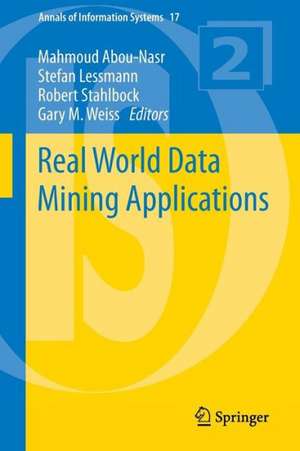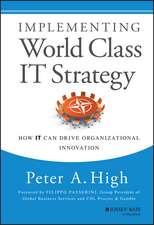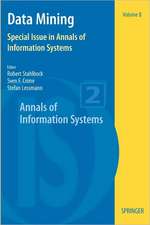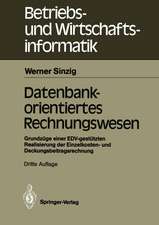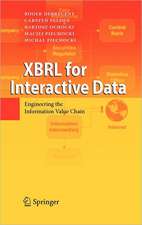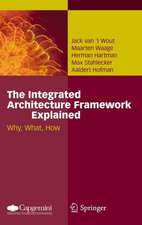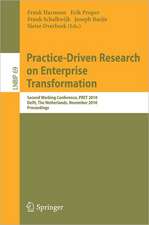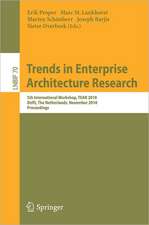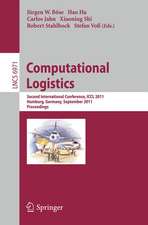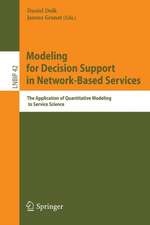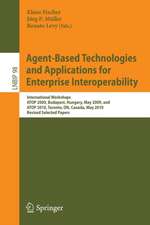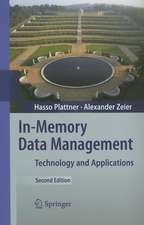Real World Data Mining Applications: Annals of Information Systems, cartea 17
Editat de Mahmoud Abou-Nasr, Stefan Lessmann, Robert Stahlbock, Gary M. Weissen Limba Engleză Paperback – 26 noi 2014
Din seria Annals of Information Systems
- 15%
 Preț: 648.24 lei
Preț: 648.24 lei - 18%
 Preț: 1379.84 lei
Preț: 1379.84 lei - 15%
 Preț: 643.65 lei
Preț: 643.65 lei - 15%
 Preț: 637.13 lei
Preț: 637.13 lei - 15%
 Preț: 645.60 lei
Preț: 645.60 lei -
 Preț: 385.25 lei
Preț: 385.25 lei - 20%
 Preț: 752.54 lei
Preț: 752.54 lei -
 Preț: 385.47 lei
Preț: 385.47 lei -
 Preț: 387.75 lei
Preț: 387.75 lei -
 Preț: 386.99 lei
Preț: 386.99 lei - 20%
 Preț: 648.59 lei
Preț: 648.59 lei -
 Preț: 384.31 lei
Preț: 384.31 lei - 18%
 Preț: 727.31 lei
Preț: 727.31 lei - 15%
 Preț: 644.18 lei
Preț: 644.18 lei - 18%
 Preț: 1222.17 lei
Preț: 1222.17 lei -
 Preț: 384.48 lei
Preț: 384.48 lei - 20%
 Preț: 641.67 lei
Preț: 641.67 lei - 5%
 Preț: 1093.72 lei
Preț: 1093.72 lei - 20%
 Preț: 992.26 lei
Preț: 992.26 lei - 20%
 Preț: 639.72 lei
Preț: 639.72 lei
Preț: 647.27 lei
Preț vechi: 761.49 lei
-15% Nou
Puncte Express: 971
Preț estimativ în valută:
123.89€ • 134.62$ • 104.14£
123.89€ • 134.62$ • 104.14£
Carte tipărită la comandă
Livrare economică 22 aprilie-06 mai
Preluare comenzi: 021 569.72.76
Specificații
ISBN-13: 9783319078113
ISBN-10: 3319078119
Pagini: 418
Ilustrații: XVI, 418 p. 144 illus., 96 illus. in color.
Dimensiuni: 155 x 235 x 27 mm
Greutate: 0.61 kg
Ediția:2015
Editura: Springer International Publishing
Colecția Springer
Seria Annals of Information Systems
Locul publicării:Cham, Switzerland
ISBN-10: 3319078119
Pagini: 418
Ilustrații: XVI, 418 p. 144 illus., 96 illus. in color.
Dimensiuni: 155 x 235 x 27 mm
Greutate: 0.61 kg
Ediția:2015
Editura: Springer International Publishing
Colecția Springer
Seria Annals of Information Systems
Locul publicării:Cham, Switzerland
Public țintă
ResearchCuprins
Introduction.- What Data Scientists can Learn from History.- On Line Mining of Cyclic Association Rules From Parallel Dimension Hierarchies.- PROFIT: A Projected Clustering Technique.- Multi-Label Classification with a Constrained Minimum Cut Model.- On the Selection of Dimension Reduction Techniques for Scientific Applications.- Relearning Process for SPRT In Structural Change Detection of Time-Series Data.- K-means clustering on a classifier-induced representation space: application to customer contact personalization.- Dimensionality Reduction using Graph Weighted Subspace Learning for Bankruptcy Prediction.- Click Fraud Detection: Adversarial Pattern Recognition over 5 years at Microsoft.- A Novel Approach for Analysis of 'Real World' Data: A Data Mining Engine for Identification of Multi-author Student Document Submission.- Data Mining Based Tax Audit Selection: A Case Study of a Pilot Project at the Minnesota Department of Revenue.- A nearest neighbor approach to build a readable risk score for breast cancer.- Machine Learning for Medical Examination Report Processing.- Data Mining Vortex Cores Concurrent with Computational Fluid Dynamics Simulations.- A Data Mining Based Method for Discovery of Web Services and their Compositions.- Exploiting Terrain Information for Enhancing Fuel Economy of Cruising Vehicles by Supervised Training of Recurrent Neural Optimizers.- Exploration of Flight State and Control System Parameters for Prediction of Helicopter Loads via Gamma Test and Machine Learning Techniques.- Multilayer Semantic Analysis In Image Databases.
Notă biografică
Dr. Abou-Nasr is a Senior Member of the IEEE and Vice Chair of the Computational Intelligence & Systems Man and Cybernetics, Southeast Michigan Chapter. He has received the B.Sc. degree in Electrical Engineering in 1977 from the University of Alexandria, Egypt, the M.S. and the Ph.D. degrees in 1984 and 1994 respectively from the University of Windsor, Ontario, Canada, both in Electrical Engineering. Currently he is a Technical Expert with Ford Motor Company, Research and Advanced Engineering, Modern Control Methods and Computational Intelligence Group, where he leads research & development of neural network and advanced computational intelligence techniques for automotive applications. His research interests are in the areas of neural networks, data mining, machine learning, pattern recognition, forecasting, optimization and control. He is an adjunct faculty member of the computer science department, Wayne State University, Detroit, Michigan and was an adjunct faculty member of the operations research department, University of Michigan Dearborn. Prior to joining Ford, he held electronics and software engineering positions with the aerospace and robotics industries in the areas of real-time control and embedded communications protocols. He is an associate editor of the DMIN'09-DMIN'14 proceedings and a member of the program and technical committees of IJCNN, DMIN, WCCI, ISVC, CYBCONF and ECAI. He is also a reviewer for IJCNN, MSC, CDC, Neural Networks, Control & Engineering Practice and IEEE Transactions on Neural Networks & Learning Systems. Dr. Abou-Nasr has organized and chaired special sessions in DMIN and IJCNN conferences, as well as international classification competitions in WCCI 2008 in Hong Kong and IJCNN2011 in San Jose CA.
Dr. Lessmann received a M.Sc. and a Ph.D. in Business Administration from the University of Hamburg (Germany) in 2001 and 2007, respectively. He is currently employed as a lecturer inInformation Systems at the University of Hamburg. Stefan is also a member of the Centre for Risk Research at the University of Southampton, where he teaches courses in Management Science and Information Systems. His research concentrates on managerial decision support and advanced analytics in particular. He is especially interested in predictive modeling to solve planning problems in marketing, finance, and operations management. He has published several papers in leading scholarly outlets including the European Journal of Operational Research, the ICIS Proceedings or the International Journal of Forecasting. He is also involved with consultancy in the aforementioned domains and has completed several technology-transfer projects in the publishing, the automotive and the logistics industry.
Dr. Stahlbock holds a diploma in Business Administration and a PhD from the University of Hamburg (Germany). He is currently employed as a lecturer and researcher at the Institute of Information Systems at the University of Hamburg. He is also lecturer at FOM University of Applied Sciences (Germany) since 2003. His research interests are focused on managerial decision support and issues related to maritime logistics and other industries as well as operations research, information systems and business intelligence. He is author of research studies published in international prestigious journals as well as conference proceedings and book chapters and serves as reviewer for international leading journals as well as a member of conference program committees. He is General Chair of the International Conference on Data Mining (DMIN) since 2006.
Dr. Gary Weiss is an Associate Professor in the Computer and Information Science Department at Fordham University in New York City. His current research involves the mining of sensor data from smartphones and other mobile devices in support of activity recognition and related applications. His Wireless Sensor Data Mining (WISDM) Labrecently released the actitracker activity tracking app (actitracker.com). Prior to coming to Fordham, Dr. Weiss worked at AT&T Labs as a software engineer, expert system developer, and as a data scientist. He received a B.S. degree in Computer Science from Cornell University, an M.S. degree in Computer Science from Stanford University, and a Ph.D. degree in Computer Science from Rutgers University. He has published over fifty papers in machine learning and data mining and his research is supported by funding from the National Science Foundation, Google, and Citigroup.
Dr. Lessmann received a M.Sc. and a Ph.D. in Business Administration from the University of Hamburg (Germany) in 2001 and 2007, respectively. He is currently employed as a lecturer in Information Systems at the University of Hamburg. Stefan is also a member of the Centre for Risk Research at the University of Southampton, where he teaches courses in Management Science and Information Systems. His research concentrates on managerial decision support and advanced analytics in particular. He is especially interested in predictive modeling to solve planning problems in marketing, finance, and operations management. He has published several papers in leading scholarly outlets including the European Journal of Operational Research, the ICIS Proceedings or the International Journal of Forecasting. He is also involved with consultancy in the aforementioned domains and has completed several technology-transfer projects in the publishing, the automotive and the logistics industry.
Dr. Stahlbock holds a diploma in Business Administration and a PhD from the University of Hamburg (Germany). He is currently employed as a lecturer and researcher at the Institute of Information Systems at the University of Hamburg. He is also lecturer at FOM University of Applied Sciences (Germany) since 2003. His research interests are focused on managerial decision support and issues related to maritime logistics and other industries as well as operations research, information systems and business intelligence. He is author of research studies published in international prestigious journals as well as conference proceedings and book chapters and serves as reviewer for international leading journals as well as a member of conference program committees. He is General Chair of the International Conference on Data Mining (DMIN) since 2006.
Dr. Gary Weiss is an Associate Professor in the Computer and Information Science Department at Fordham University in New York City. His current research involves the mining of sensor data from smartphones and other mobile devices in support of activity recognition and related applications. His Wireless Sensor Data Mining (WISDM) Lab recently released the actitracker activity tracking app (actitracker.com). Prior to coming to Fordham, Dr. Weiss worked at AT&T Labs as a software engineer, expert system developer, and as a data scientist. He received a B.S. degree in Computer Science from Cornell University, an M.S. degree in Computer Science from Stanford University, and a Ph.D. degree in Computer Science from Rutgers University. He has published over fifty papers in machine learning and data mining and his research is supported by funding from the National Science Foundation, Google, and Citigroup.
Dr. Lessmann received a M.Sc. and a Ph.D. in Business Administration from the University of Hamburg (Germany) in 2001 and 2007, respectively. He is currently employed as a lecturer in Information Systems at the University of Hamburg. Stefan is also a member of the Centre for Risk Research at the University of Southampton, where he teaches courses in Management Science and Information Systems. His research concentrates on managerial decision support and advanced analytics in particular. He is especially interested in predictive modeling to solve planning problems in marketing, finance, and operations management. He has published several papers in leading scholarly outlets including the European Journal of Operational Research, the ICIS Proceedings or the International Journal of Forecasting. He is also involved with consultancy in the aforementioned domains and has completed several technology-transfer projects in the publishing, the automotive and the logistics industry.
Dr. Stahlbock holds a diploma in Business Administration and a PhD from the University of Hamburg (Germany). He is currently employed as a lecturer and researcher at the Institute of Information Systems at the University of Hamburg. He is also lecturer at FOM University of Applied Sciences (Germany) since 2003. His research interests are focused on managerial decision support and issues related to maritime logistics and other industries as well as operations research, information systems and business intelligence. He is author of research studies published in international prestigious journals as well as conference proceedings and book chapters and serves as reviewer for international leading journals as well as a member of conference program committees. He is General Chair of the International Conference on Data Mining (DMIN) since 2006.
Dr. Gary Weiss is an Associate Professor in the Computer and Information Science Department at Fordham University in New York City. His current research involves the mining of sensor data from smartphones and other mobile devices in support of activity recognition and related applications. His Wireless Sensor Data Mining (WISDM) Lab recently released the actitracker activity tracking app (actitracker.com). Prior to coming to Fordham, Dr. Weiss worked at AT&T Labs as a software engineer, expert system developer, and as a data scientist. He received a B.S. degree in Computer Science from Cornell University, an M.S. degree in Computer Science from Stanford University, and a Ph.D. degree in Computer Science from Rutgers University. He has published over fifty papers in machine learning and data mining and his research is supported by funding from the National Science Foundation, Google, and Citigroup.
Dr. Lessmann received a M.Sc. and a Ph.D. in Business Administration from the University of Hamburg (Germany) in 2001 and 2007, respectively. He is currently employed as a lecturer inInformation Systems at the University of Hamburg. Stefan is also a member of the Centre for Risk Research at the University of Southampton, where he teaches courses in Management Science and Information Systems. His research concentrates on managerial decision support and advanced analytics in particular. He is especially interested in predictive modeling to solve planning problems in marketing, finance, and operations management. He has published several papers in leading scholarly outlets including the European Journal of Operational Research, the ICIS Proceedings or the International Journal of Forecasting. He is also involved with consultancy in the aforementioned domains and has completed several technology-transfer projects in the publishing, the automotive and the logistics industry.
Dr. Stahlbock holds a diploma in Business Administration and a PhD from the University of Hamburg (Germany). He is currently employed as a lecturer and researcher at the Institute of Information Systems at the University of Hamburg. He is also lecturer at FOM University of Applied Sciences (Germany) since 2003. His research interests are focused on managerial decision support and issues related to maritime logistics and other industries as well as operations research, information systems and business intelligence. He is author of research studies published in international prestigious journals as well as conference proceedings and book chapters and serves as reviewer for international leading journals as well as a member of conference program committees. He is General Chair of the International Conference on Data Mining (DMIN) since 2006.
Dr. Gary Weiss is an Associate Professor in the Computer and Information Science Department at Fordham University in New York City. His current research involves the mining of sensor data from smartphones and other mobile devices in support of activity recognition and related applications. His Wireless Sensor Data Mining (WISDM) Labrecently released the actitracker activity tracking app (actitracker.com). Prior to coming to Fordham, Dr. Weiss worked at AT&T Labs as a software engineer, expert system developer, and as a data scientist. He received a B.S. degree in Computer Science from Cornell University, an M.S. degree in Computer Science from Stanford University, and a Ph.D. degree in Computer Science from Rutgers University. He has published over fifty papers in machine learning and data mining and his research is supported by funding from the National Science Foundation, Google, and Citigroup.
Dr. Lessmann received a M.Sc. and a Ph.D. in Business Administration from the University of Hamburg (Germany) in 2001 and 2007, respectively. He is currently employed as a lecturer in Information Systems at the University of Hamburg. Stefan is also a member of the Centre for Risk Research at the University of Southampton, where he teaches courses in Management Science and Information Systems. His research concentrates on managerial decision support and advanced analytics in particular. He is especially interested in predictive modeling to solve planning problems in marketing, finance, and operations management. He has published several papers in leading scholarly outlets including the European Journal of Operational Research, the ICIS Proceedings or the International Journal of Forecasting. He is also involved with consultancy in the aforementioned domains and has completed several technology-transfer projects in the publishing, the automotive and the logistics industry.
Dr. Stahlbock holds a diploma in Business Administration and a PhD from the University of Hamburg (Germany). He is currently employed as a lecturer and researcher at the Institute of Information Systems at the University of Hamburg. He is also lecturer at FOM University of Applied Sciences (Germany) since 2003. His research interests are focused on managerial decision support and issues related to maritime logistics and other industries as well as operations research, information systems and business intelligence. He is author of research studies published in international prestigious journals as well as conference proceedings and book chapters and serves as reviewer for international leading journals as well as a member of conference program committees. He is General Chair of the International Conference on Data Mining (DMIN) since 2006.
Dr. Gary Weiss is an Associate Professor in the Computer and Information Science Department at Fordham University in New York City. His current research involves the mining of sensor data from smartphones and other mobile devices in support of activity recognition and related applications. His Wireless Sensor Data Mining (WISDM) Lab recently released the actitracker activity tracking app (actitracker.com). Prior to coming to Fordham, Dr. Weiss worked at AT&T Labs as a software engineer, expert system developer, and as a data scientist. He received a B.S. degree in Computer Science from Cornell University, an M.S. degree in Computer Science from Stanford University, and a Ph.D. degree in Computer Science from Rutgers University. He has published over fifty papers in machine learning and data mining and his research is supported by funding from the National Science Foundation, Google, and Citigroup.
Dr. Lessmann received a M.Sc. and a Ph.D. in Business Administration from the University of Hamburg (Germany) in 2001 and 2007, respectively. He is currently employed as a lecturer in Information Systems at the University of Hamburg. Stefan is also a member of the Centre for Risk Research at the University of Southampton, where he teaches courses in Management Science and Information Systems. His research concentrates on managerial decision support and advanced analytics in particular. He is especially interested in predictive modeling to solve planning problems in marketing, finance, and operations management. He has published several papers in leading scholarly outlets including the European Journal of Operational Research, the ICIS Proceedings or the International Journal of Forecasting. He is also involved with consultancy in the aforementioned domains and has completed several technology-transfer projects in the publishing, the automotive and the logistics industry.
Dr. Stahlbock holds a diploma in Business Administration and a PhD from the University of Hamburg (Germany). He is currently employed as a lecturer and researcher at the Institute of Information Systems at the University of Hamburg. He is also lecturer at FOM University of Applied Sciences (Germany) since 2003. His research interests are focused on managerial decision support and issues related to maritime logistics and other industries as well as operations research, information systems and business intelligence. He is author of research studies published in international prestigious journals as well as conference proceedings and book chapters and serves as reviewer for international leading journals as well as a member of conference program committees. He is General Chair of the International Conference on Data Mining (DMIN) since 2006.
Dr. Gary Weiss is an Associate Professor in the Computer and Information Science Department at Fordham University in New York City. His current research involves the mining of sensor data from smartphones and other mobile devices in support of activity recognition and related applications. His Wireless Sensor Data Mining (WISDM) Lab recently released the actitracker activity tracking app (actitracker.com). Prior to coming to Fordham, Dr. Weiss worked at AT&T Labs as a software engineer, expert system developer, and as a data scientist. He received a B.S. degree in Computer Science from Cornell University, an M.S. degree in Computer Science from Stanford University, and a Ph.D. degree in Computer Science from Rutgers University. He has published over fifty papers in machine learning and data mining and his research is supported by funding from the National Science Foundation, Google, and Citigroup.
Textul de pe ultima copertă
Introduction
Mahmoud Abou-Nasr, Stefan Lessmann. Robert Stahlbock, Gary M. Weiss
What Data Scientists can Learn from History
Aaron Lai
On Line Mining of Cyclic Association Rules From Parallel Dimension Hierarchies
Eya Ben Ahmed, Ahlem Nabli, Faıez Gargouri
PROFIT: A Projected Clustering Technique
Dharmveer Singh Rajput, Pramod Kumar Singh, Mahua Bhattacharya
Multi-Label Classification with a Constrained Minimum Cut Model
Guangzhi Qu, Ishwar Sethi, Craig Hartrick, Hui Zhang
On the Selection of Dimension Reduction Techniques for Scientific Applications
Ya Ju Fan, Chandrika Kamath
Relearning Process for SPRT in Structural Change Detection of Time-Series Data
Ryosuke Saga, Naoki Kaisaku, Hiroshi Tsuji
K-means clustering on a classifier-induced representation space: application to customer contact personalization
Vincent Lemaire, Fabrice Clerot, Nicolas Creff
Dimensionality Reduction using Graph Weighted Subspace Learning for Bankruptcy Prediction
Bernardete Ribeiro, Ning Chen
Click Fraud Detection: Adversarial Pattern Recognition over 5 Years at Microsoft
Brendan Kitts, Jing Ying Zhang, Gang Wu, Wesley Brandi, Julien Beasley, Kieran Morrill, John Ettedgui, Sid Siddhartha, Hong Yuan, Feng Gao, Peter Azo, Raj Mahato
A Novel Approach for Analysis of ’Real World’ Data: A Data Mining Engine for Identification of Multi-author Student Document Submission
Kathryn Burn-Thornton, Tim Burman
Data Mining Based Tax Audit Selection: A Case Study of a Pilot Project at the Minnesota Department of Revenue
Kuo-Wei Hsu, Nishith Pathak, Jaideep Srivastava, Greg Tschida, Eric Bjorklund
A nearest neighbor approach to build a readable risk score forbreast cancer
Emilien Gauthier, Laurent Brisson, Philippe Lenca, Stephane Ragusa
Machine Learning for Medical Examination Report Processing
Yinghao Huang, Yi Lu Murphey, Naeem Seliya, Roy B. Friedenthal
Data Mining Vortex Cores Concurrent with Computational Fluid Dynamics Simulations
Clifton Mortensen, Steve Gorrell, Robert Woodley, Michael Gosnell
A Data Mining Based Method for Discovery of Web Services and their Compositions
Richi Nayak, Aishwarya Bose
Exploiting Terrain Information for Enhancing Fuel Economy of Cruising Vehicles by Supervised Training of Recurrent Neural Optimizers
Mahmoud Abou-Nasr, John Michelini, Dimitar Filev
Exploration of Flight State and Control System Parameters for Prediction of Helicopter Loads via Gamma Test and Machine Learning Techniques
Catherine Cheung, Julio J. Valdes, Matthew Li
Multilayer Semantic Analysis In Image Databases
Ismail El Sayad, Jean Martinet, Zhongfei (Mark) Zhang, Peter Eisert
Mahmoud Abou-Nasr, Stefan Lessmann. Robert Stahlbock, Gary M. Weiss
What Data Scientists can Learn from History
Aaron Lai
On Line Mining of Cyclic Association Rules From Parallel Dimension Hierarchies
Eya Ben Ahmed, Ahlem Nabli, Faıez Gargouri
PROFIT: A Projected Clustering Technique
Dharmveer Singh Rajput, Pramod Kumar Singh, Mahua Bhattacharya
Multi-Label Classification with a Constrained Minimum Cut Model
Guangzhi Qu, Ishwar Sethi, Craig Hartrick, Hui Zhang
On the Selection of Dimension Reduction Techniques for Scientific Applications
Ya Ju Fan, Chandrika Kamath
Relearning Process for SPRT in Structural Change Detection of Time-Series Data
Ryosuke Saga, Naoki Kaisaku, Hiroshi Tsuji
K-means clustering on a classifier-induced representation space: application to customer contact personalization
Vincent Lemaire, Fabrice Clerot, Nicolas Creff
Dimensionality Reduction using Graph Weighted Subspace Learning for Bankruptcy Prediction
Bernardete Ribeiro, Ning Chen
Click Fraud Detection: Adversarial Pattern Recognition over 5 Years at Microsoft
Brendan Kitts, Jing Ying Zhang, Gang Wu, Wesley Brandi, Julien Beasley, Kieran Morrill, John Ettedgui, Sid Siddhartha, Hong Yuan, Feng Gao, Peter Azo, Raj Mahato
A Novel Approach for Analysis of ’Real World’ Data: A Data Mining Engine for Identification of Multi-author Student Document Submission
Kathryn Burn-Thornton, Tim Burman
Data Mining Based Tax Audit Selection: A Case Study of a Pilot Project at the Minnesota Department of Revenue
Kuo-Wei Hsu, Nishith Pathak, Jaideep Srivastava, Greg Tschida, Eric Bjorklund
A nearest neighbor approach to build a readable risk score forbreast cancer
Emilien Gauthier, Laurent Brisson, Philippe Lenca, Stephane Ragusa
Machine Learning for Medical Examination Report Processing
Yinghao Huang, Yi Lu Murphey, Naeem Seliya, Roy B. Friedenthal
Data Mining Vortex Cores Concurrent with Computational Fluid Dynamics Simulations
Clifton Mortensen, Steve Gorrell, Robert Woodley, Michael Gosnell
A Data Mining Based Method for Discovery of Web Services and their Compositions
Richi Nayak, Aishwarya Bose
Exploiting Terrain Information for Enhancing Fuel Economy of Cruising Vehicles by Supervised Training of Recurrent Neural Optimizers
Mahmoud Abou-Nasr, John Michelini, Dimitar Filev
Exploration of Flight State and Control System Parameters for Prediction of Helicopter Loads via Gamma Test and Machine Learning Techniques
Catherine Cheung, Julio J. Valdes, Matthew Li
Multilayer Semantic Analysis In Image Databases
Ismail El Sayad, Jean Martinet, Zhongfei (Mark) Zhang, Peter Eisert
Caracteristici
Addresses the broad range of issues in data mining Looks at applications in business and management, fraud detection, and new medical applications Covers established and cutting-edge applications Includes supplementary material: sn.pub/extras
